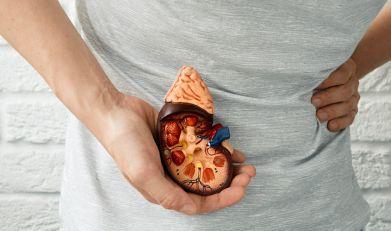

09 Nov, 2023
In ancient times, kidney stones were like unwelcome guests crashing a bodily banquet. Imagine ancient folks grappling with the mysterious pain of tiny rock formations in their kidneys. No modern tools, just the agony of enduring what feels like the wrath of the gods inside you. They probably tried chanting, herbal potions, or maybe even a stern talking-to with the kidney stones. Fortunately, today we have a more scientific approach—hydration and medical marvels!
Kidney stones are hard, pebble-like pieces of material that form in one or both of your kidneys when high levels of certain minerals are in your urine. Kidney stones rarely cause permanent damage if treated by a health care professional.
Kidney stones vary in size and shape. They may be as small as a grain of sand or as large as a pea. Rarely, some kidney stones are as big as golf balls. Kidney stones may be smooth or jagged and are usually yellow or brown.
A small kidney stone may pass through your urinary tract on its own, causing little or no pain. A larger kidney stone may get stuck along the way. A kidney stone that gets stuck can block your flow of urine, causing severe pain or bleeding.
Calcium stones
It including calcium oxalate stones and calcium phosphate stones, are the most common types of kidney stones. Calcium oxalate stones are more common than calcium phosphate stones. Calcium from food does not increase your chance of having calcium oxalate stones. Normally, extra calcium that isn’t used by your bones and muscles goes to your kidneys and is flushed out with urine. When this doesn’t happen, the calcium stays in the kidneys and joins with other waste products to form a kidney stone.
Uric acid stones
A uric acid stone may form when your urine contains too much acid. Eating a lot of fish, shellfish, and meat—especially organ meat—may increase uric acid in urine.
Struvite stones
Struvite stones may form after you have a UTI. They can develop suddenly and become large quickly.
Cystine stones
Cystine stones result from a disorder called cystinuria that is passed down through families. Cystinuria causes the amino acid cystine to leak through your kidneys and into the urine.
If you have a history of stones:
What dissolves kidney stones fast?
Certain substances, including apple cider vinegar and lemon juice, may help dissolve kidney stones, making them easier to pass. Drinking plenty of fluids can help pass kidney stones and prevent new stones from forming. The extra liquid flush can help out toxins, moving stones and grit through your urinary tract.
How long does it take to pass a stone?
The time to pass a kidney stone is highly variable and depends on the size and location of the stone itself,
“Having a smaller stone (less than 4 millimeters in size) and having a stone lower in the ureter (closer to the bladder) are two factors that improve the chance of passing a kidney stone
Conclusion
Understanding kidney stones and dispelling common myths is essential for proper management and prevention. By addressing these misconceptions, you can make informed decisions about your health and take steps to reduce your risk of kidney stone formation. Knowledge is a powerful tool in the fight against kidney stones, and by sharing accurate information, you can help others better navigate this challenging condition.